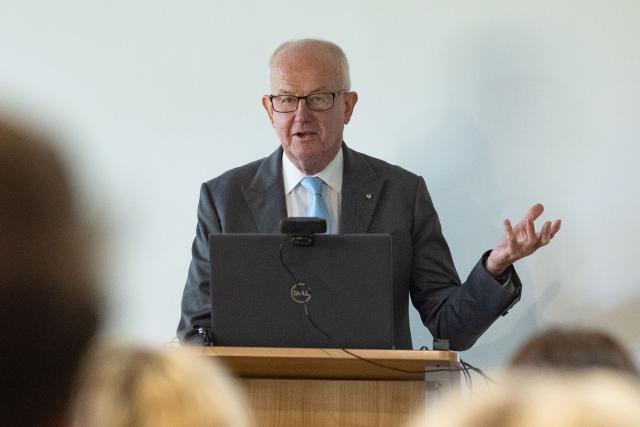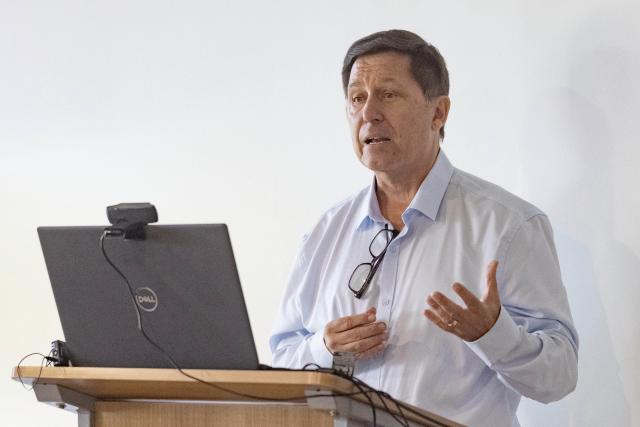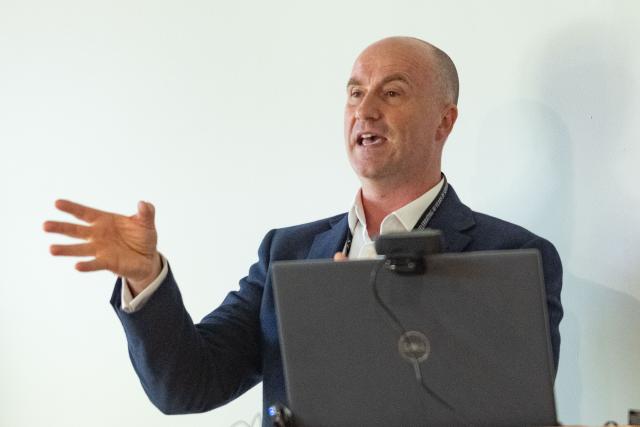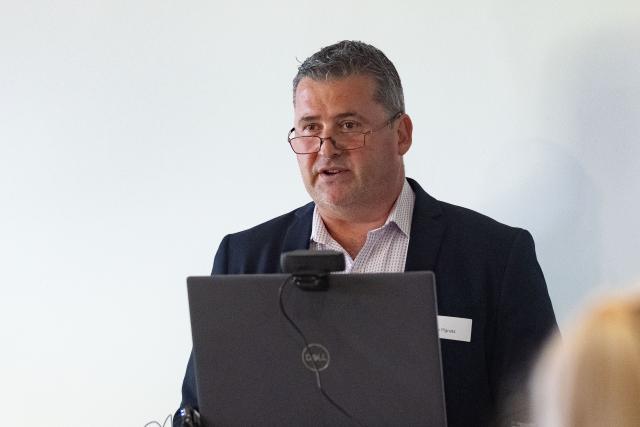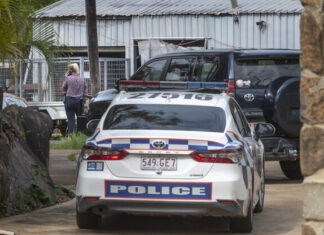Child sexual exploitation (CSE) is happening here.
This is the message the Integrated Family and Youth Service (IFYS) want to shout out to spark a greater awareness of CSE and end the abuse through their initiative Project Paradigm which was launched at Birtinya on Monday.
IFYS managing director Tony Pignata was joined by former Queensland Police Commissioner Bob Atkinson and Former FBI agent Dr Dennis Desmond to deliver a picture of CSE and its proliferation across the country, much of it being initiated through online platforms.
IFYS, which was established on the Sunshine Coast 40 years ago, delivers a range of specialist support and intervention programs for children, young people and families, and has expanded over the years, now employing 850 people and providing 65 services across Queensland.
The Project Paradigm campaign is designed to drive action and prevention and to encourage people to report the signs of abuse. It builds on the work of IFYS in 2022 in which they educated and engaged more than 600 professionals, 700 parents resulting in direct contact with almost 150,000 children.
CSE can occur in many ways, through an individual or organised crime and the affects on children are lifelong, Mr Pignata said.
Bob Atkinson, who was one of six commissioners on the Royal Commission into Institutional Responses to Child Sex Abuse, told guests it had been 10 years since the Royal Commission which had created a groundswell of activity, and raised awareness of CSE within institutions.
Children abused in institutions make up only 20 per cent or less of children sexually abused with most abuse occurring in a familiar context, many through technology, Mr Atkinson said.
“It’s such a new area. We have to make sure we do all we can to prevent it and respond to it at the earliest opportunity,“ he said.
“It destroys trust. For children, when trust is destroyed that causes lifelong harm.“
The Royal Commission called for people to come forward and tell their stories. Some did so in public hearings while others were able to speak in privacy.
There was no doubt children had been sexually abused and all organisations including faith-based and sporting organisations involved with children were mentioned, except Girl Guides, he said.
“Many people came forward because they didn’t want to see what had happened to them happen to other children,“ Mr Atkinson said.
“So many people wanted to come forward to tell their story. They did from all over Australia. Many people had never told anyone what happened to them.
“There were 57 public hearings but we had so much information they could have had 1000 public hearings.
“By 57 we had enough to make evidence-based recommendations. We found a lack of research in areas but that was not surprising. CSE did not even have a language to describe it.“
The inquiry commissioned 59 research reports and made 409 recommendations.
In 2018 the Queensland Government established the Truth, Healing and Reconciliation Taskforce, chaired by Mr Atkinson, to listen to people who have experienced institutional child sexual abuse, provide support and advice the government on the implementation of the Royal Commissions’s recommendations.
“The challenge now is maintaining the momentum,“ Mr Atkinson said.
“There is no end to this – this is a battlefield
Former FBI Special Agent and US Cyber Intelligence officer and now USC lecturer Dennis Desmond told guests the advent of the internet had thrown the FBI, that was accustomed to traditional methods of investigation, into chaos.
Now collecting evidence is mainly online and much of it involves phones, he said.
“We’re looking at fraud, scams, online recruitment of children, leading to abuse in the physical world,” he said.
During his work in the violent crimes against children unit with the FBI Dr Desmond was tasked with training agents to catch child predators by being decoys, creating profiles and identities of children, engaging pedophiles and arranging meetings where they could be arrested.
Pedophiles were categorised into travellers and traders. Travellers spot and groom their victims then engage them in the physical world in places such as parks, shopping centres and libraries.
Traders deal in online material such as videos and stills. It’s more difficult for law enforcers to identify these criminals and engage them, he said.
Dr Desmond said advances in technology had created a significant shift in crime fighting in this area with perpetrators becoming more sophisticated in their approach. They can geo locate their computers to another location. They can hide their identities, use the dark web, encrypt and send messages, trade using crypto currency that is difficult to identify. They are harder to deceive, with technology allowing them to identify their contacts.
“It’s a technology war between pedophiles and law enforcement,“ he said.
New artificial intelligence (AI) software enables uses to create fake images and data. They can create fake identities that speak in a child’s voice using chat bots.
If perpetrators want to create a letter to a 13-year-old they can go to ChatGPT which can produce it using the right slang and intonation for that cohort.
“It’s a technology arms race,“ he said.
Dr Desmond said in the online world it has become difficult to tell real from fakes, gaming platforms are allowing strangers into people’s houses and it is making parental control difficult.
IFYS CSE principal advisor Conrad Townsend told the forum Project paradigm was working to end child exploitation through collaboration, advocacy and support.
“No organisation can combat this alone,“ he said.
“On a global context a conservative view is that 10 million children are being exploited any one time, but it’s more likely 120 million.“
It doesn’t discriminate across gender, socio-economic demographics. It’s vulnerability. And the cost to the community is enormous with estimates one CSE incident will cost the community $500,000, he said.
Mr Townsend said children most at risk at were those aged 13-15, socially isolated, disengaged, with a history of family breakdown and criminal exploitation.
Predators most commonly engage victims through the creation of an inappropriate boyfriend/girlfriend relationship.
In a common scenario a young person is approached by an individual who treats them well, says they love them, steers them away from their friends and family and introduces them to drugs.
They become complacent and dependent and this leads to sexual exploitation and trafficking.
On the Sunshine Coast children as young as 12 have been sexually exploited, Mr Townsend said.
Victims have been trafficked, involved in online and in person engagement. Victims have been intimidated and threatened with death or the targeting of siblings if they say anything, he said. And peer to peer recruitment is common.
“We’re seeing it happening all over Australia,“ Mr Townsend said.
“Parents and carers don’t understand what they’re seeing. They don’t think it’s what they should be concerned about. They think it’s something that happens overseas. It’s happening in our neighbourhoods, our backyards.“
Through a survey IFYS found only three per cent of parents thought online grooming was a concern.
With a Sunshine Coast Council grant, IFYS plan to hold a series of workshops targeting tourism and hotel industries.
“We know hotels are used regularly for trafficking. We know hospitality staff see things, but don’t know what to do,“ he said.
“We have an epidemic. It needs to be identified and recognised.“
To find out more, visit projectparadigm.com.au

